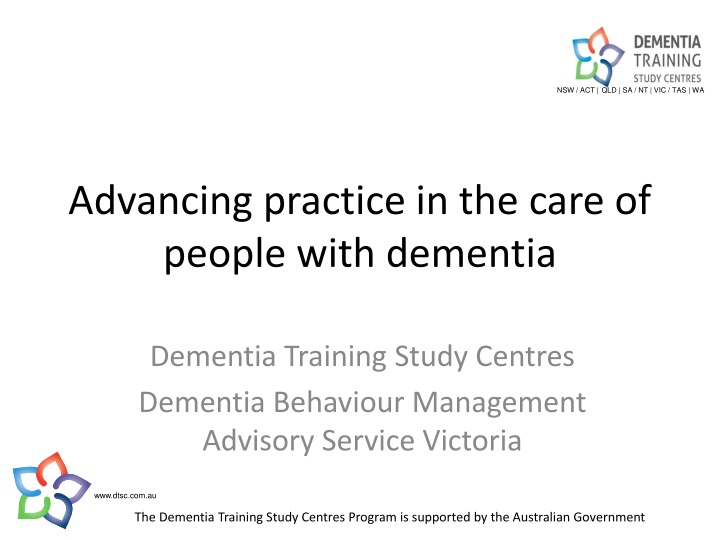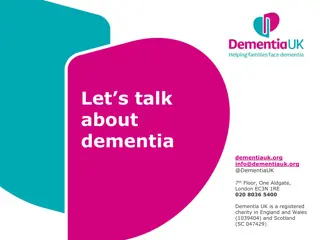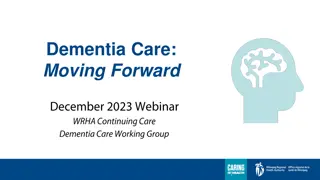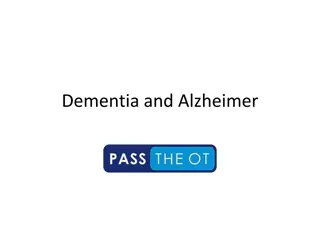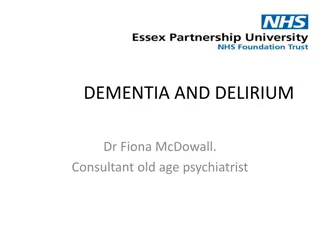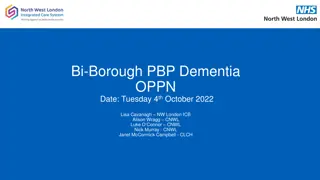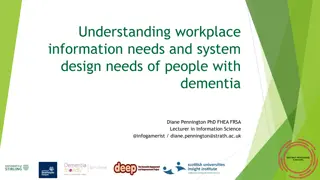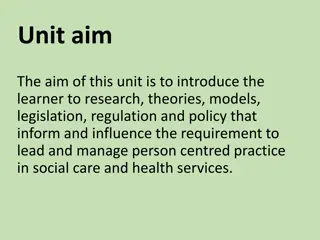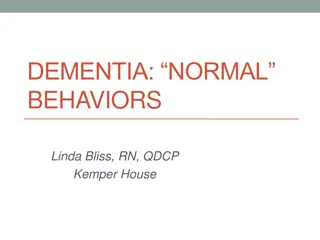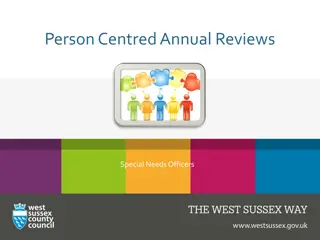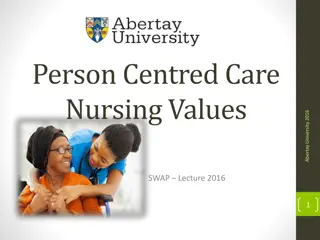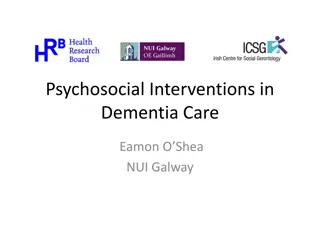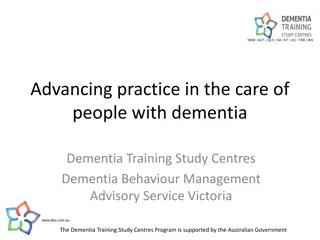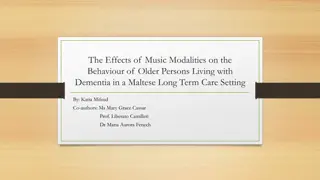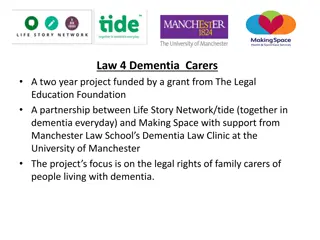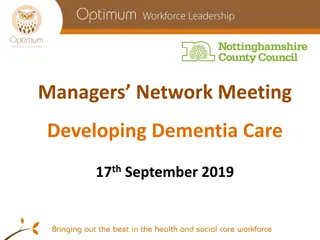Person-Centred Care in Dementia Management
Explore the importance of person-centred care in dementia practice, focusing on shared values, empathy, and impact of care practices. Discover the philosophy behind person-centred care and engage in discussions to understand what it means to individuals and groups. Learn common themes such as respect, autonomy, and communication in providing quality care for persons with dementia.
Download Presentation

Please find below an Image/Link to download the presentation.
The content on the website is provided AS IS for your information and personal use only. It may not be sold, licensed, or shared on other websites without obtaining consent from the author.If you encounter any issues during the download, it is possible that the publisher has removed the file from their server.
You are allowed to download the files provided on this website for personal or commercial use, subject to the condition that they are used lawfully. All files are the property of their respective owners.
The content on the website is provided AS IS for your information and personal use only. It may not be sold, licensed, or shared on other websites without obtaining consent from the author.
E N D
Presentation Transcript
NSW / ACT | QLD | SA / NT | VIC / TAS | WA Advancing practice in the care of people with dementia Dementia Training Study Centres Dementia Behaviour Management Advisory Service Victoria www.dtsc.com.au The Dementia Training Study Centres Program is supported by the Australian Government
Session 5 NSW / ACT | QLD | SA / NT | VIC / TAS | WA Philosophy of care: Person-centred care Learning outcomes: Understand the importance of a shared vision and values for person-centred care and its link to the delivery of a quality service to people living with dementia Empathise with the persons experience of dementia Increase your awareness of how care practices impact on those you support Discuss what is meant by person-centred care Measure person-centred care www.dtsc.com.au The Dementia Training Study Centres Program is supported by the Australian Government
NSW / ACT | QLD | SA / NT | VIC / TAS | WA Person-centred care The only way to care for someone with dementia It is now accepted that a person-centred approach to care and practice informed by research evidence is the basis of quality care. www.dtsc.com.au The Dementia Training Study Centres Program is supported by the Australian Government
NSW / ACT | QLD | SA / NT | VIC / TAS | WA A philosophy of care ..is a system of principles, beliefs, goals or values that guide and direct the services and care that we provide or aspire to provide to the people in our care. This philosophy is often reflected in the organisations vision and mission statement and drives the culture of the organisation, teams and the care provided. www.dtsc.com.au The Dementia Training Study Centres Program is supported by the Australian Government
Activity NSW / ACT | QLD | SA / NT | VIC / TAS | WA What PCC means to you In groups discuss: What person-centred care means to you What others in the group say PCC means to them What commonalities and differences did you find with others Why you think these commonalities and differences occur www.dtsc.com.au The Dementia Training Study Centres Program is supported by the Australian Government The Dementia Training Study Centres Program is supported by the Australian Government
NSW / ACT |QLD | SA / NT | VIC / TAS | WA PCC: Common themes Respect for individuality and values Meaning Therapeutic alliance Social context and relationships Inclusive model of health and well-being Expert lay knowledge Shared responsibility Communication Autonomy Professional as a person (Hughes et al., 2010) www.dtsc.com.au The Dementia Training Study Centres Program is supported by the Australian Government
Why person-centred care? NSW / ACT |QLD | SA / NT | VIC / TAS | WA It is much more important to know what sort of a person has a disease than what sort of disease a patient has. (William Osler) www.dtsc.com.au The Dementia Training Study Centres Program is supported by the Australian Government The Dementia Training Study Centres Program is supported by the Australian Government
Person-centred care NSW / ACT |QLD | SA / NT | VIC / TAS | WA Concept first introduced by Carl Rogers in 1951 Kitwood introduced concept of Personhood and PCC for people with dementia in 1997 Respect and preservation of dignity as core principles Much more than providing choice Relationship and connection with the individual www.dtsc.com.au The Dementia Training Study Centres Program is supported by the Australian Government
NSW / ACT |QLD | SA / NT | VIC / TAS | WA Defining PCC .. the need for a recognition of, and connection with, the person, a focus on the person s strengths and goals, an interdisciplinary approach, and recognition of the centrality of relationships. (Nay, Edvardsson & Fetherstonhaugh, 2009) www.dtsc.com.au The Dementia Training Study Centres Program is supported by the Australian Government
Self identity and personhood NSW / ACT |QLD | SA / NT | VIC / TAS | WA It is not necessarily the dementia that affects the sense of self; it is often the changed relationship and responses from those around the person with dementia that has the biggest impact. Our role as care providers is to support the person living with dementia to maintain personhood. We can achieve this through person-centred care, the quality of the relationship we develop with the person, and understanding the persons experience of dementia and of the experience of care. www.dtsc.com.au The Dementia Training Study Centres Program is supported by the Australian Government
NSW / ACT |QLD | SA / NT | VIC / TAS | WA The quality agenda and person-centred care PCC has same constructs as quality care Reflected in Quality Standards for all care settings www.dtsc.com.au The Dementia Training Study Centres Program is supported by the Australian Government
The experience of care NSW / ACT |QLD | SA / NT | VIC / TAS | WA recognise how our care practices impact on the person and their families. move away from ways of working that are centred on the task or medical condition to see the person behind the disease (Edvardsson et al, 2010). the experience of being a care recipient of hospital, community or residential aged care has been described and encourages service providers to ensure their practices promote quality of care and quality of life. www.dtsc.com.au The Dementia Training Study Centres Program is supported by the Australian Government
The person-centred workplace NSW / ACT |QLD | SA / NT | VIC / TAS | WA Kitwood (1997) strongly advocated that in order for staff to provide person-centred care they need to experience a person-centred workplace www.dtsc.com.au The Dementia Training Study Centres Program is supported by the Australian Government
A person-centred organisation NSW / ACT |QLD | SA / NT | VIC / TAS | WA A person-centred organisation will have: a person-centred philosophy that is understood and embraced by all staff leadership that models person-centredness in all actions and decisions relationships across the organisation that demonstrate valuing of employees flexible systems and processes that enable staff to move away from task oriented care environments that value and support people living with dementia, families and staff and acknowledge the importance of supportive relationships to wellbeing (Nay et al., 2009) www.dtsc.com.au The Dementia Training Study Centres Program is supported by the Australian Government
NSW / ACT |QLD | SA / NT | VIC / TAS | WA Barriers Poor clarity about what constitutes person-centred care Enablers Knowledgeable and skilled dementia champions Stakeholder participation in service development Time restrictions Limited staff autonomy to choose to practice in a person- centred way Staff training and education Organisational support Organisational needs being prioritised over the consumer s needs Delivering the service in the person s home (Dow et al., 2006; Tinney et al., 2007) (Dow et al., 2006) www.dtsc.com.au The Dementia Training Study Centres Program is supported by the Australian Government
Being person-centred NSW / ACT |QLD | SA / NT | VIC / TAS | WA Know the person: Gather information about the person Life history or key information? www.dtsc.com.au The Dementia Training Study Centres Program is supported by the Australian Government
Life history NSW / ACT |QLD | SA / NT | VIC / TAS | WA Life history can be used effectively to support staff to understand the person s experiences of dementia, their needs and behaviour in the context of their life provide emotional care by developing an understanding of the persons past experiences and the way they have coped with life events; Support the person s identity (personhood); Build relationships with the person and their family as well as to support the person to develop a sense of belonging and meaningful connections with their peers; Support interaction and communication (verbal and behavioural); Provide individualised care such as maintaining habitual routines and access to preferred occupation and activities. (Sanderson and Lewis, 2011) www.dtsc.com.au The Dementia Training Study Centres Program is supported by the Australian Government
Dementia Behaviour Management Advisory Service (DBMAS) Vic NSW / ACT |QLD | SA / NT | VIC / TAS | WA www.dtsc.com.au The Dementia Training Study Centres Program is supported by the Australian Government The Dementia Training Study Centres Program is supported by the Australian Government
Top 5 Initiative NSW / ACT |QLD | SA / NT | VIC / TAS | WA Enables staff to work with Carers to tap into the knowledge and expertise of the person Top 5 Questions:- 1. Are there things/situations that may cause distress? 2. If unsettled are there words or actions that will settle or calm? 3. Are there routines that reassure? 4. Are there any repetitive questions or recurring issues that may need specific answers, is there someone they might call out for (person or pet) and is there any specific things they might want when they call out for that person? What is the best/ preferred answer? 5. Are there any signs that indicate a need or a want? (Department of Health Victoria) www.dtsc.com.au The Dementia Training Study Centres Program is supported by the Australian Government The Dementia Training Study Centres Program is supported by the Australian Government
Models of PCC NSW / ACT |QLD | SA / NT | VIC / TAS | WA Model or Framework Population Dementia specific The VIPS Framework Brooker (2007) The Senses framework Nolan et al. (2004) Older people Residential and Health care Health Care Person-centred Nursing Framework McCormack et al. (2010) Eight Dimensions of Person-Centred Care. PickerInstitute (2012) Person-centred practice: Best care for older people everywhere. The toolkit. Dept.HealthVictoria (2012) Patient-centredness: a conceptual framework Mead and Bower (2000) Health care Medicine www.dtsc.com.au The Dementia Training Study Centres Program is supported by the Australian Government
NSW / ACT |QLD | SA / NT | VIC / TAS | WA Making person-centred care tangible and measurable www.dtsc.com.au The Dementia Training Study Centres Program is supported by the Australian Government
Tool Setting All Care Fit for VIPS (Brooker, UK) TURNIP: The Tool for Understanding Residents Needs as Individual Persons (Edvardsson et al. Australia) P-CAT: Person-centred Care Assessment Tool (Edvardsson et al. Australia) DCM: Dementia Care Mapping (Bradford dementia group UK) Long term care improvement guide self-assessment tool (Picker Institute. US) POPAC: The Person-centred care of Older People with cognitive impairment in Acute Care Scale. (Edvardsson et al. Australia) The Person-Centred Climate Questionnaire staff and patient versions. (Edvardsson et al. Australia) PCIS: The Person-Centred Inpatient Scale. (Coyle and Williams) The Client-Centred Care Questionnaire (De Witte et al.) Valuing People (Alzheimer s Australia Vic) NSW / ACT |QLD | SA / NT | VIC / TAS | WA Residential care Acute care Community www.dtsc.com.au The Dementia Training Study Centres Program is supported by the Australian Government The Dementia Training Study Centres Program is supported by the Australian Government
